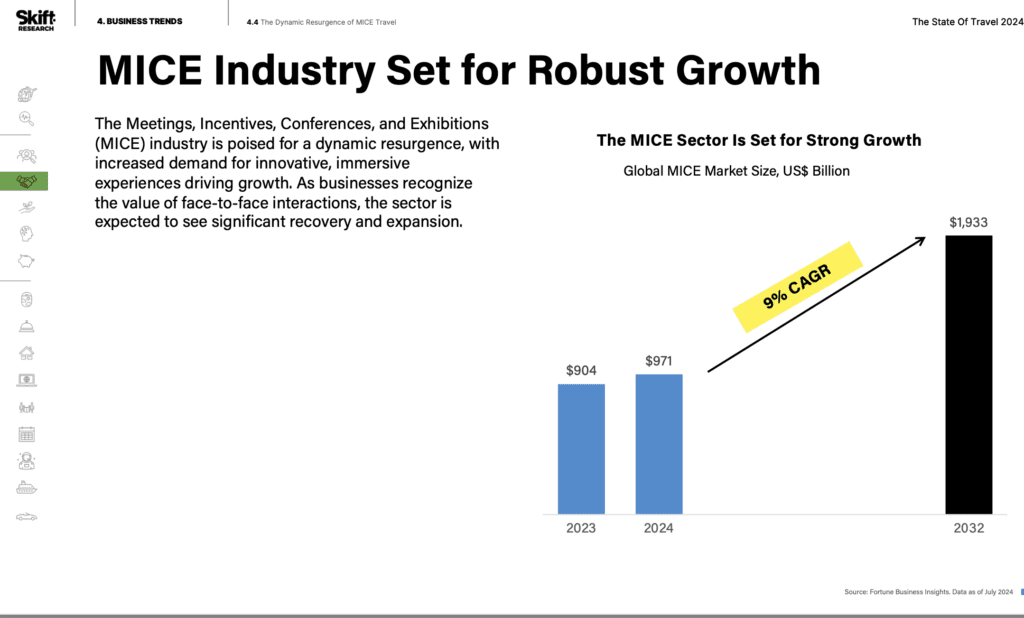Skift Take
Hotels have been warning of soft demand in general, but when it comes to meetings and events, it’s “very, very strong” (to quote Hilton’s CEO). One travel management firm told us they’ve doubled staff to capture the business.
Thousands of companies have traded in their big office spaces in favor of remote work. But team building is tough on Zoom and many are organizing regular in-person gatherings to bring employees together.
That shift has a growing number of travel managers and hotels revamping their offerings to cater to this new kind of business travel.
Reed & Mackay is one such company. The 62-year-old travel management firm recently doubled its meetings and events staff to address growing demand for offsite internal events.
âThat’s been a big surge from our client base, as well as just in the industry in general,â said DeAnne Dale, who oversees sales for North America at UK-based Reed & Mackay.
That surge has translated to a boost in revenue and an increase in global staff, as well as the acquisition of three new companies with expertise in meetings and events. Clients are doubling or tripling the number of gatherings they hold yearly and reorganizing how they operate in light of new trends, Dale said.
Merging Business Travel and Meetings
While business travel might have been handled by a travel manager in human resources, meetings and events were often organized by administrative assistants. Potential synergies and savings were often being left on the table.Â
When lumping all travel and meetings together, companies can get better rates for general business travel and see savings of 15% to 20% on meetings, said Tim Wagner, senior vice president of consulting services at travel management tech platform HRS. Companies get better pricing from scale and travel suppliers get more business.
Grant Caplan, president at travel consulting firm Procurigence, said he has one client who booked 8,000 rooms at a single hotel for one year alone but company meetings weren’t included during negotiations.
âYou can imagine that hotelier was interested in my client’s business,â Caplan said. âWhen we went back and said, âWell, how about we also throw in some meetings,â they were hungry enough for the 8,000 that they were glad to make some room on the meeting side to honor our transient room rate for those meetings.â
While Dale expects regular business travel to remain at about 80% of pre-pandemic levels, demand for meetings is expected to stay strong.
âLarger meetings and events, side incentive trips, the partner conferences, things like that, have doubled in volume,â Dale said.Â
The recent State of Travel report from Skift Research noted that the Meetings industry is set for strong growth through 2032.


How Hotels Are Responding
Hoteliers have noticed.Â
Employees arenât seeing each other five days a week, and companies âare seeking to do more retreats or employee off sites or team meetings, and we’ve seen a significant rise in that,” Frank Passanante, senior vice president at Hilton, said in July.
“We’re doing some things and some innovative things that we’re providing that really are helping to support the growth that we’re seeing in small meetings and small events and small off site gatherings,â he said. Among them, Hilton has made it easier to book room blocks and meeting spaces online with customized packages in real time.
Hilton CEO Christopher Nassetta said during its earnings call this month that while business travel would be âa little bit higher,â itâs looking to be âvery, very strong for meetings and events.â
Streamlining the meetings experience for potential clients has become a priority for some groups. Sonesta and Drury hotels have changed the way their sales teams do business so that customers have a single point of contact to attend to the changing demands of business travel, something they say clients value greatly.
“Instead of just [being] focused on corporate business travel, they now are one point of contact for corporate business travel and group travel,â said Brian Macaluso, vice president of global sales at Sonesta Hotels. âOne point of contact always makes it easier.â
Drury, which is family-owned and operated, reorganized its sales team after Covid-19 as well, moving away from the traditional format with sales managers and sales executives in charge of clusters of hotels to a smaller national team overseeing sales, according to Cassie Peppenhorst, the chainâs sales director.
The shift helps Drury get “more visibility to their total spend across their different types of travel and at times, that can maybe leverage them into some different negotiations,” Peppenhorst said. “At the end of the day, everyone wins.”

